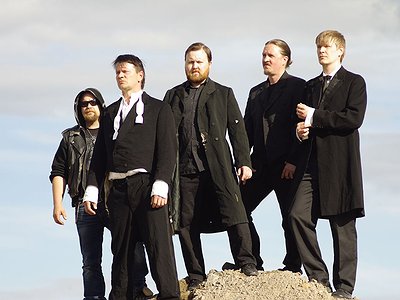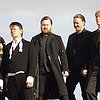Name: Skepticism (Jani Kekarainen)
Members: Matti, Jani Kekarainen, Pasi Pöyry, Lasse Pelkonen
Nationality: Finnish
Current Album: Ordeal on Svart Records
Labels: Red Stream, Svart
Musical Recommendations: This is old stuff, but one of my old time favourite is the soundtrack of Conan the Barbarian. The music is composed by Basil Poledouris. It’s an extremely nice example how classical orchestra & music can be used for a soundtrack. I like the versatility and also the violin & cello sounds on the album.
Another example could be a group called Dirty Granny Tales. I just witnessed their show at the Dark Bombastic Evening festival in Transylvania, Romania. Very interesting live performer. Watching the show was a bit like reading Neil Gaiman’s Sandman comics.
When did you start writing/producing music - and what or who were your early passions and influences?
[Jani] I bought an electric bass guitar when I was 12 years old. It was my first musical instrument. I borrowed some tablature books from a local library and started practicing some simple heavy metal and rock’n roll songs. A couple of friends of mine started playing guitar at the same time. Our ultimate target was to found a great rock band one day. We practiced a lot together, but we never founded a band with these guys. One day one friend of mine borrowed my bass guitar and he was pretty nice guy, as he sold my bass guitar to a second hand store (of course without asking me) and bought beer with the money. That caused a break to my practicing.
A bit later I bought an electric guitar from a friend. It was a Washburn and looked a bit like Gibson SG. I also bought a small amplifier and started practicing with a newbie drummer. That was actually the foundation of my current band Skepticism. It happened somewhere in the late 80’s. I was very keen to learn anything close to melodic metal music back then. I was playing guitar on daily basis and all the time I tried to learn something new; a new technique or a new song and so on. I started learning typical heavy metal songs and later on continued by learning thrash metal and even some classical music. After I'd played a while with my drummer friend, I started writing my own songs. We recorded them on c-tapes. After some years we listened those first recordings and they sounded terrible. The attitude was there, but the lack of playing skills was clearly visible. I guess, that’s how most bands get started.
For most artists, originality is first preceded by a phase of learning and, often, emulating others. What was this like for you? How would you describe your own development as an artist and the transition towards your own voice?
[Jani] In the beginning, I definitely tried to write similar music as the bands I liked. The obvious problem was that I wasn’t skilled enough to write or play similar music as my idols. Probably I did not recognize the problem back then. I had passion, I had motivation and I had time to rehearse. I learned a huge number of songs from the bands I liked, including all the tiny nuances, solos, etc. However, it’s an interesting fact that I never played a single cover song with my drummer friend. From the very beginning we started creating our own music. In the beginning I thought that aggressive and nightmarish sounding melodies were the only way to go. Anything else was too boring. Luckily I later on understood to use also sadness as well as major keys in my riffs.
What were your main compositional- and production-challenges in the beginning and how have they changed over time?
[Jani] When we founded our band, we wanted to create extremely heavy music. We thought that such music can be created with down-tuned guitars and adding as much bass as possible. The end result was like a thick porridge and the studio sound quality was quite bad. Still, my band's debut album (called Stormcrowfleet, released in 1995) has gained some recognition. Well, when I’m now listening to the old material, it’s somewhat surprising, it is very simple music but still it contains some very nice and clever ideas. I have been trying to get back this touch of simplicity to my newer composition work, but I haven’t really succeed.
I remember some years or moments when it was very difficult to write anything new. I think, most of the artists are familiar with that feeling; when the inspiration is completely lost. In such moments we used to go to wander into the woods with my band mates. Sometimes the inspiration was surprisingly re-found after such a trip. Nowadays I’m not worried if my inspiration is lost, because I have learnt that I will automatically get it back sooner or later. It just a matter of time and correct mood.
Later, the challenge was probably related to my current phase of life. It was challenging to find common time for practising and I wasn’t able to try my new ideas with the other band members. That was very frustrating. I have always used collective compositions methods. I might write songs, riffs and arrange harmonies, but I always bring them to my band’s training and let other members further develop my ideas. Sometimes it feels awkward but I have learnt that with that approach I’m able to produce more versatile and sometimes even unexpected music. With today's technology this has become even easier (face-to-face trainings aren’t always needed). I can easily create multitrack recordings with my iPad, guitar and electric-piano at my home and save the ideas for further processing or even share them via email.
The very current challenge might be; how to create new music for my band that is somewhat similar as the earlier material but still contains some brand new ideas. It might be that I’m a bit stuck in the style my band has developed during the past 20+ years. On the other hand, every new song is an opportunity to create something unique, something new. That’s one of the greatest thing in composition work.
Tell us about your studio, please. What were criteria when setting it up and how does this environment influence the creative process?
[Jani] Maybe the most important thing is to get into a relaxing mood. Flawless playing is not that important. Some flexibility and room for improvisation is always needed. If you’re trying too hard, the final outcome suffers. I have played many years already with my band and also gained a lot of experience in studio work. I’m not a professional in any musical area, but still because of our experiences, we know pretty well what we’re looking for in the studio. Meaning for example what kinds of sounds we’re searching. That makes the process a bit easier. In a typical studio session, we’re recording drums, a guitar and basic keyboards at once and the target is always to use those basic tracks also in the final outcome. I do not find the environment, ergonomics nor technology that important.
In my opinion the mixing session is always much more challenging than the recording session. It’s mentally pretty heavy work. Lots of breaks are needed. Otherwise you can’t hear anything properly anymore. According to my experiences, it’s good to have a couple of weeks break between the recording and mixing session.
Our latest album was recorded live in front of the audience in a music club. That was an extremely interesting experience. Brand new songs that were never played live were recorded in the session. We had the whole day to prepare the technics etc. and we recorded the album once before the doors were opened for the audience. The actual concert recording turned out to be much better than the training recording. We didn’t add any overdubs later in the studio as we wanted to create an authentic live album. I’m very happy with the fact that we decided to do the live album and I’m also satisfied with the end result. I’m not sure are we ever going to do the same again, but luckily we now have that experience.
What are currently some of the most important tools and instruments you're using?
Guitars, amplifiers, iPad & Garageband apps and electric piano with USB port. That’s pretty much all. I love the iPad & Garageband combination. It’s so easy and fast to use. Once you have an inspiration, you just need to plug-in your guitar or piano and you can immediately record your ideas, add additional harmonies and so on. I have also used GuitarPro for writing notes and sharing the files with our other guitarist.
Many contemporary production tools already take over significant parts of what would formerly have constituted compositional work. In which way do certain production tools suggest certain approaches, in which way do they limit and/or expand your own creativity?
[Jani] It’s difficult to comment, as I’m still using kind of old fashion methods. One extremely useful thing is that you can easily record a training session with your mobile phone for example and the quality is clear enough. You can immediately share the files with the other members or save them into a cloud. All that comes for free. There is no need to remember your ideas as they are available anywhere all the time.



